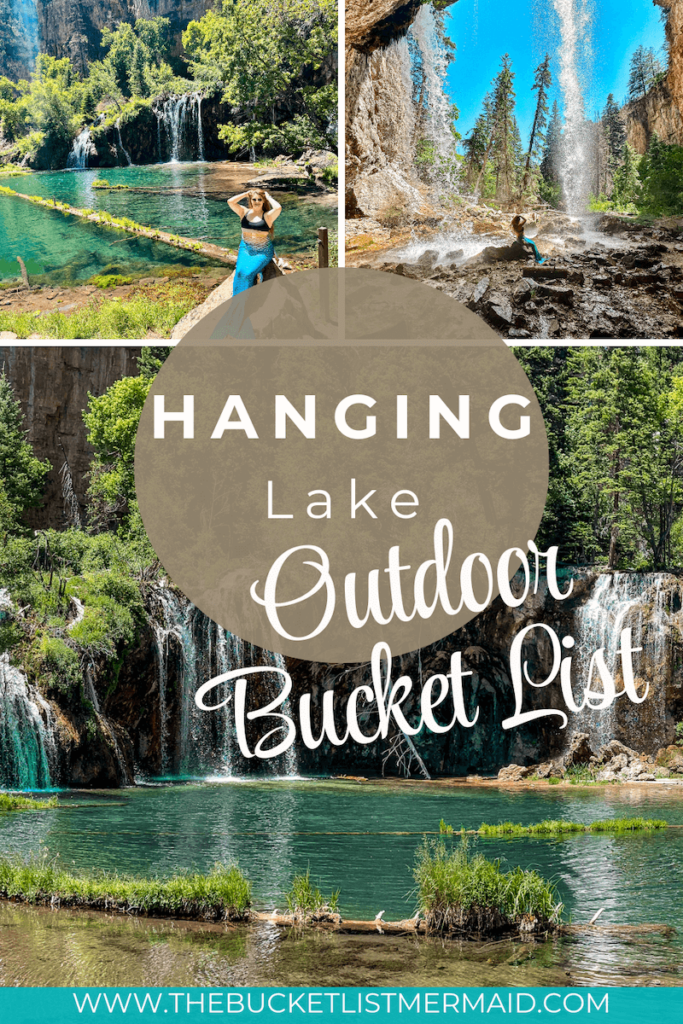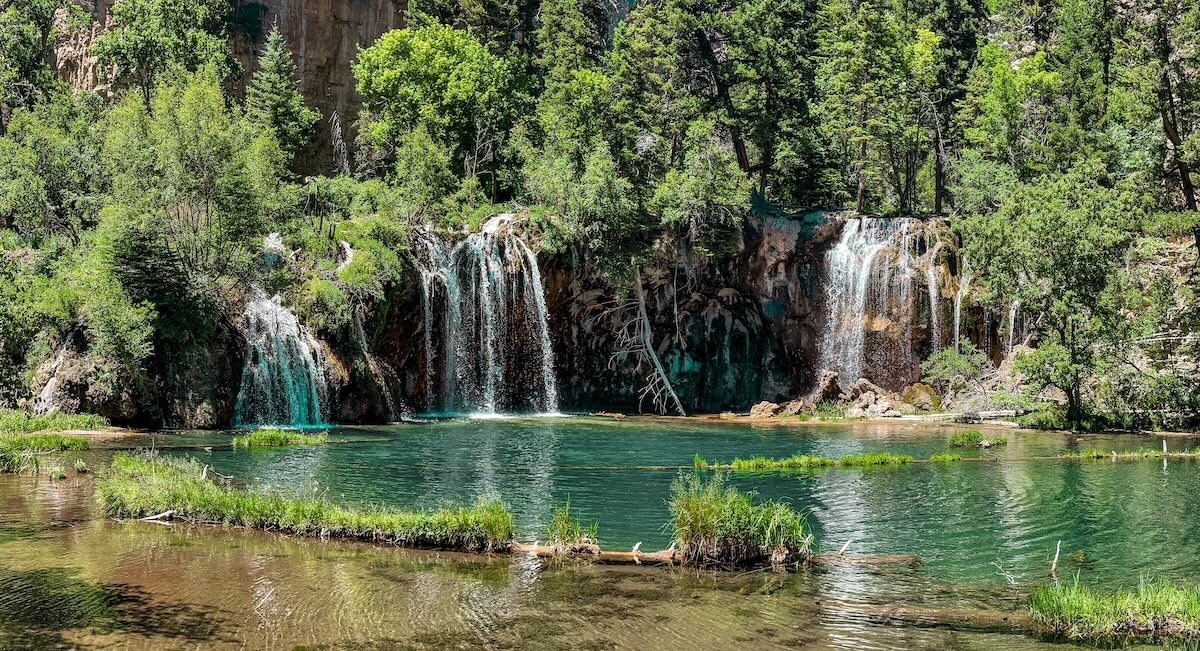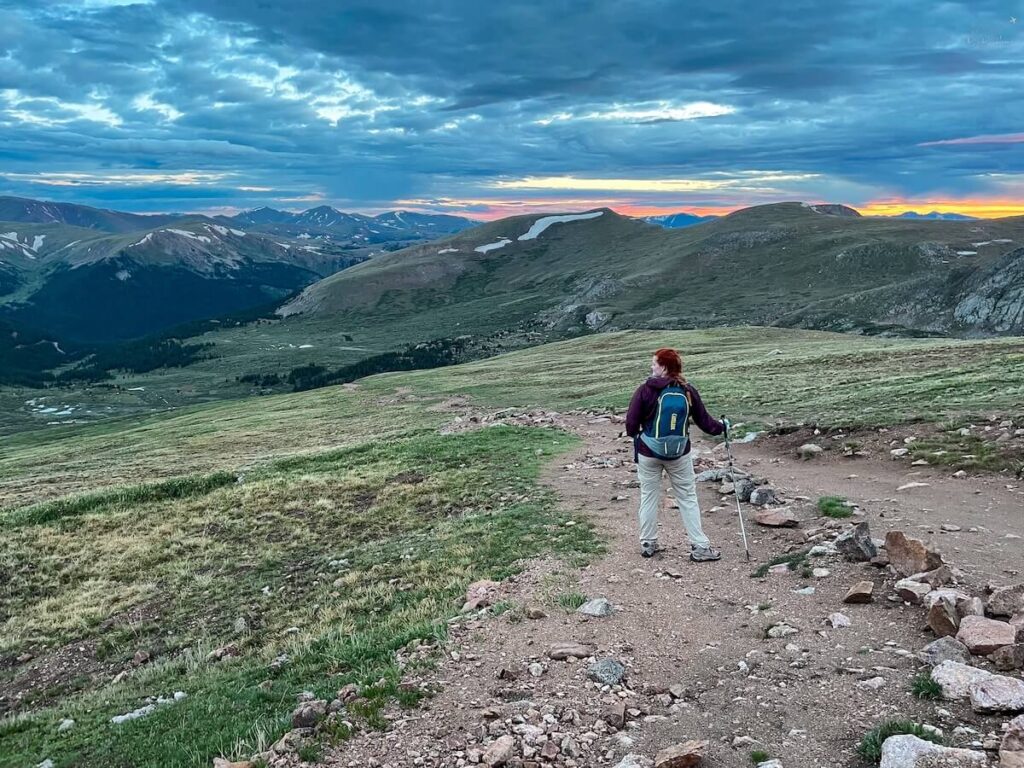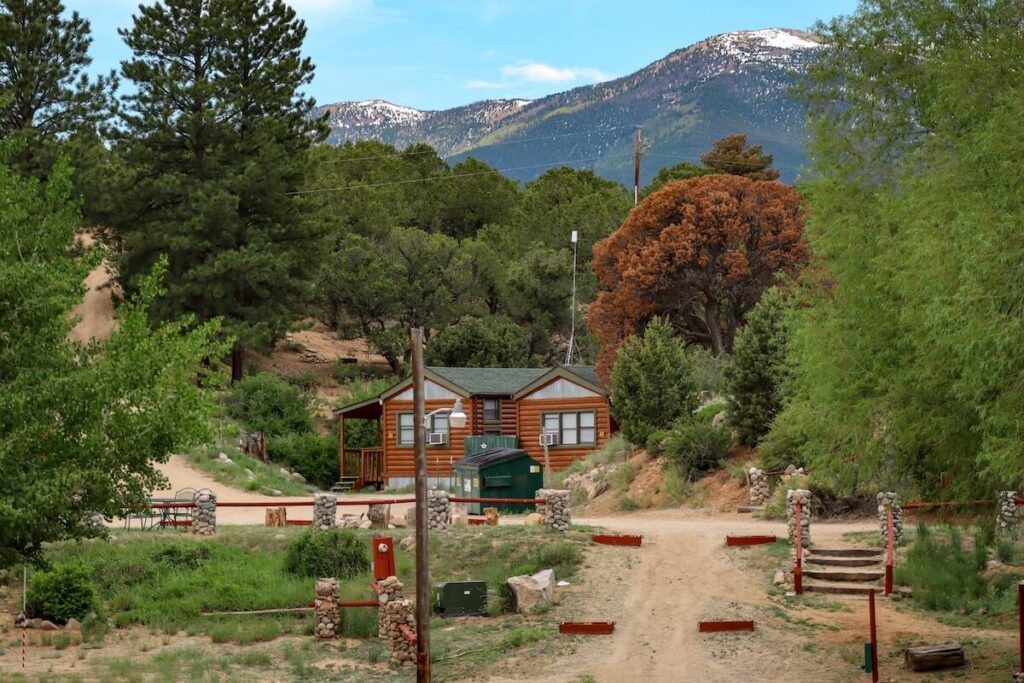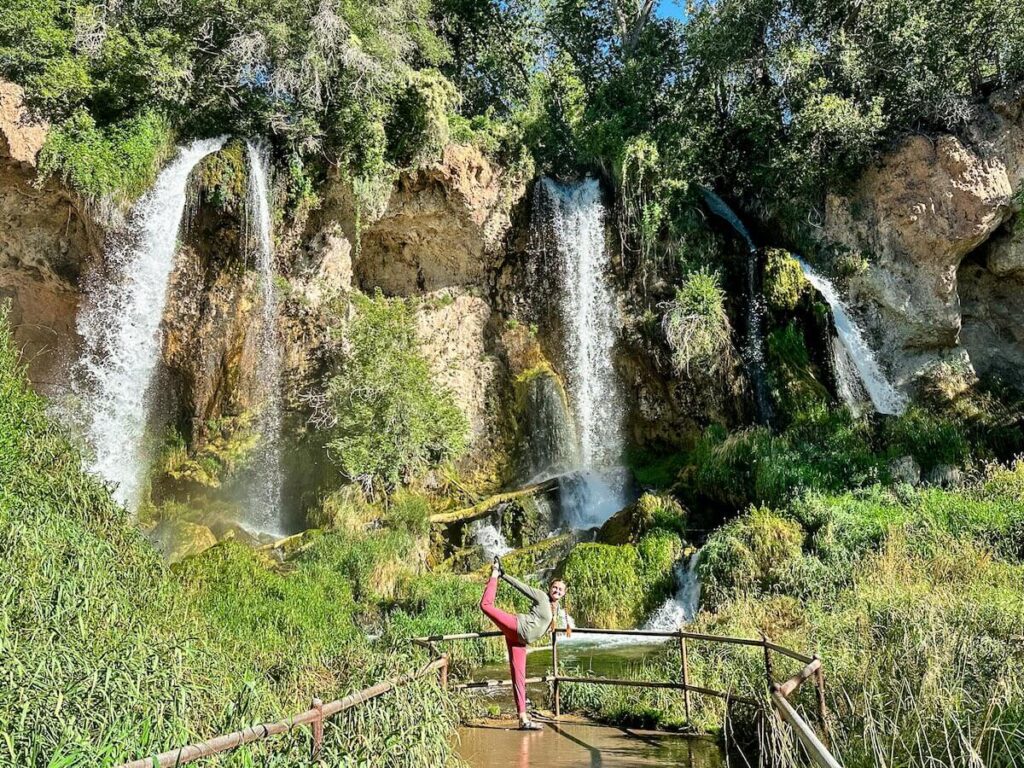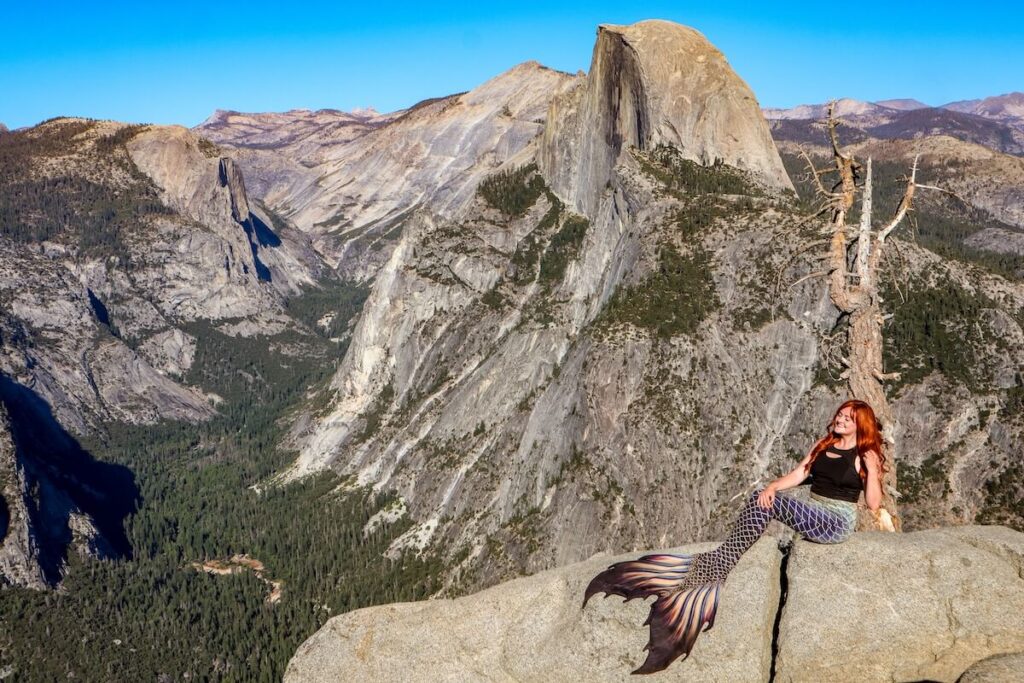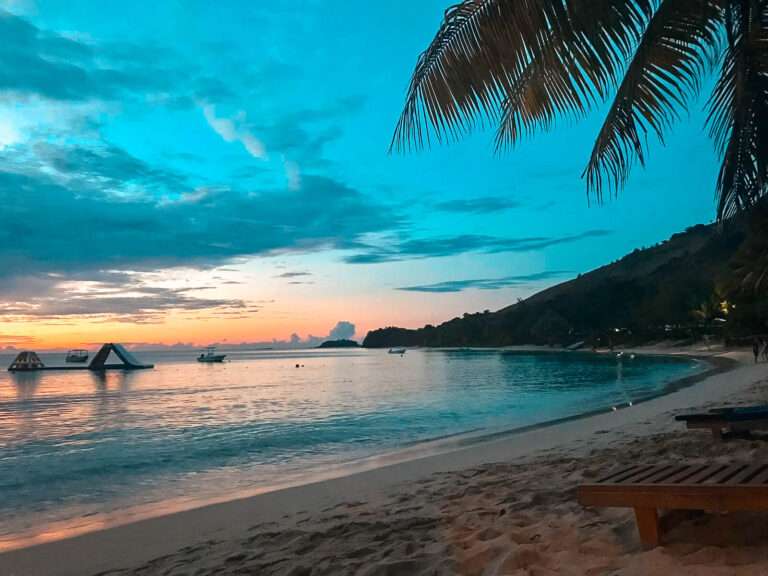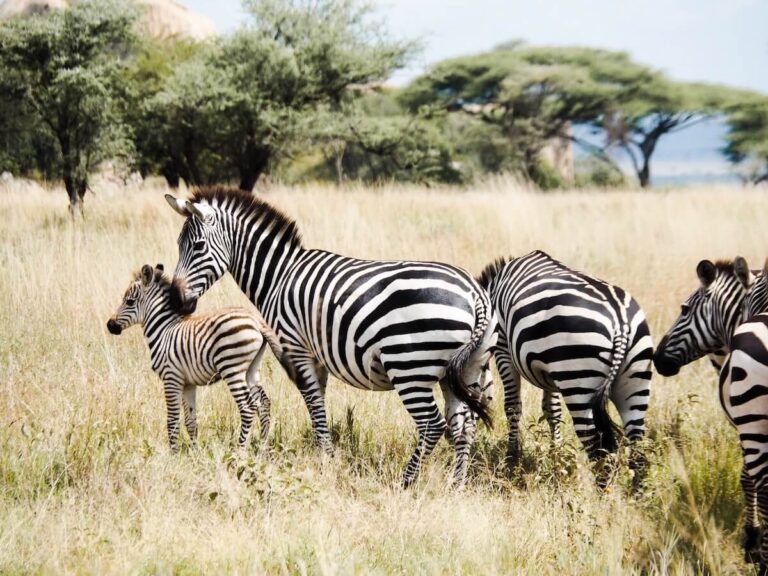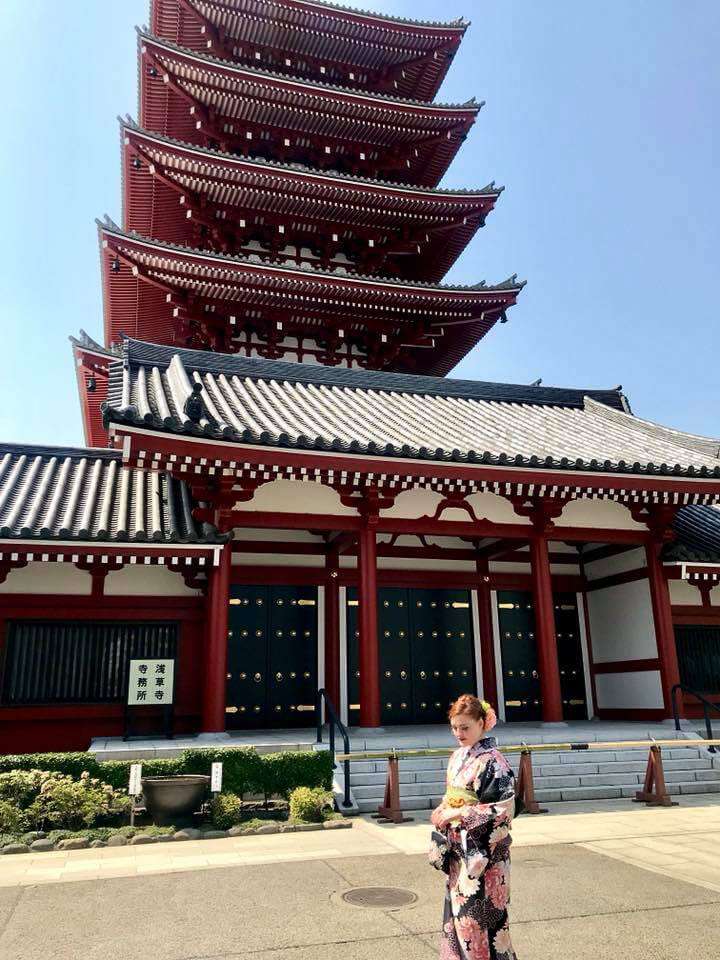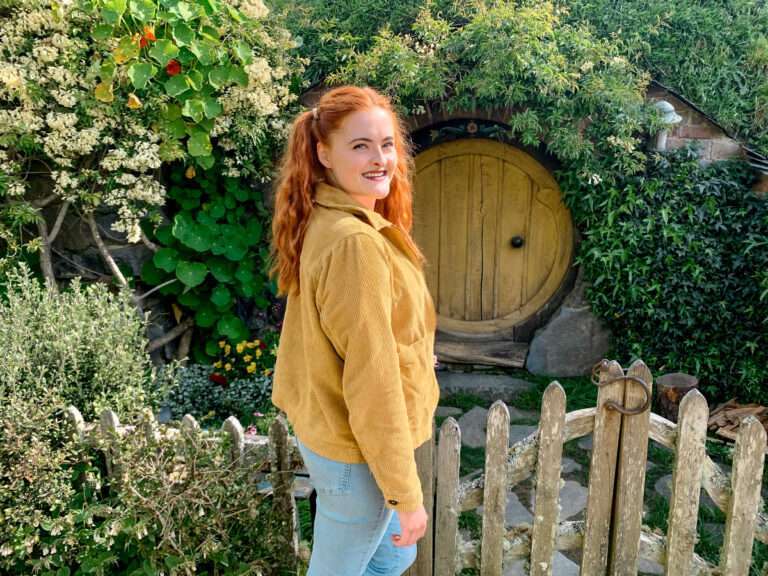Hiking Hanging Lake: Tips from a Colorado Local and Adventure Photographer
This website contains affiliate links from trusted partners. If you purchase through a link on this site, I may earn a commission at no extra cost to you. As an Amazon Associate, I earn from qualifying purchases. See my Privacy Policy and Disclosure for more information.
Updated December 2025
Hanging Lake isn’t just “another Colorado hike.”
It’s one of those mystical, almost-too-pretty-to-be-real spots that makes you stop mid-trail, gasp like a cartoon character, and immediately reach for your camera.
Between the steep switchbacks, the forest humming around you, and the final reveal of those unreal turquoise waters, it genuinely feels like stepping into a hidden chapter of Colorado’s story.
If you love bucket-list adventures (the kind where you earn every view, feel every step, and walk away with photos you’ll want to frame) Hanging Lake belongs at the top of your list.
It’s short, it’s steep, it’s unforgettable, and yes… it’s absolutely worth the hype.
This guide breaks down everything you need to know to cross Hanging Lake off your outdoor bucket list with confidence.
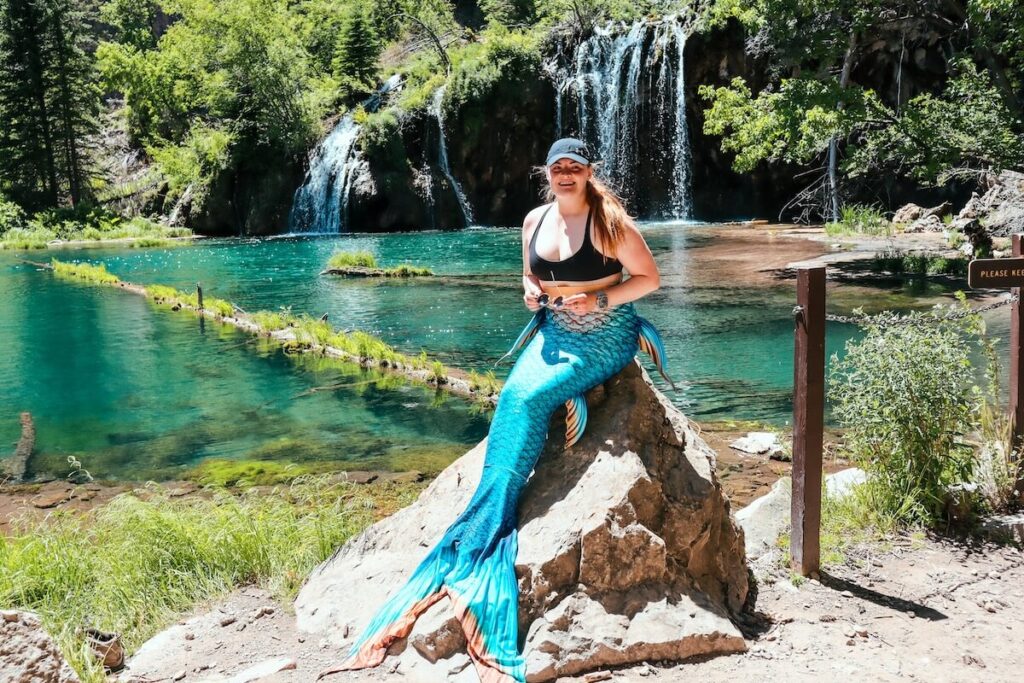
IMPORTANT NOTE: As of 2024/25, Hanging Lake is undergoing major renovations. Please check that it is open before booking your trip! I have been eagerly waiting to hike this with my aunt and we have had to reschedule several times…
Bucket List Review of Hiking Hanging Lake
| Category | Outdoor Hiking |
| Who Needs to Add This to Their Bucket List? | Hikers who love waterfalls and good mountain views! |
| Permit Time | May 1st – September 30th |
| Traveling Difficulty | Easy/Moderate |
| Physical Difficulty | Moderate/Difficult |
| Popularity Rating | 8/10 |
| Group/Tour Required | Permit Required |
| Budget | $ |
| Wheelchair Accessible | No |
| Favorite Place to Stay Near Hanging Lake | Hotel Colorado in Glenwood Springs |
If you want more information, you can check out all you need to know about my Bucket List Reviews.
Hanging Lake YouTube Video Guide
Overview of Hanging lake
Unique Features
I have been on my fair share of hikes, but I have to say that what makes this hike unique is the plethora of waterfalls that you hug most of the time during the hike.
Not hiking next to a waterfall? Then you either have a view of the forests of Glenwood Canyon or the Deadhorse Creek Canyon that you are situated in.
And that’s only the hike up. Once you reach Hanging Lake itself, you will be marveled by several waterfalls gracefully falling into the clear blue water below! It is quite a spectacle to behold.
This hike is truly next level for all of my outdoor bucket list people out there; especially those that like waterfalls.
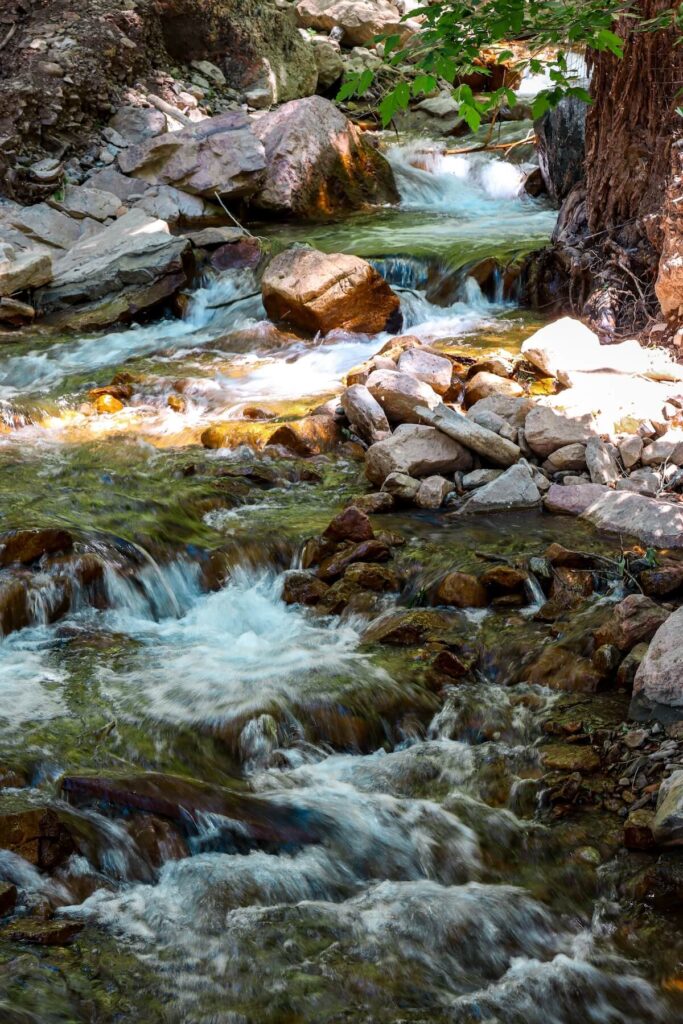
Location
Hanging Lake is situated in the middle of Glenwood Canyon, which is a sight in itself and one of my favorite drives in Colorado.
The trailhead for Hanging Lake is about 2.5 hours from Denver.
Although it might be doable, I personally wouldn’t love to pack it into a day trip from the city and recommend staying in the area.
Directions to Hanging Lake Trailhead
The Hanging Lake Trailhead has its own exit on I-70 East. It is #125 and says Hanging Lake.
There is no westbound direct exit for the trailhead.
This just means if you are coming from Denver, you will just have to go to Grizzly Creek exit #121, turn around, and then take the Hanging Lake exit #125 on I-70.
Packing List for the Hanging Lake Hike
After hiking Hanging Lake in the dead of summer, here is everything that I would recommend taking for an enjoyable and safe experience.
Keep in mind that because I am a CO native, hiking is in my blood and this is my master list for hiking! Some adventurers may need more or less depending on their needs.
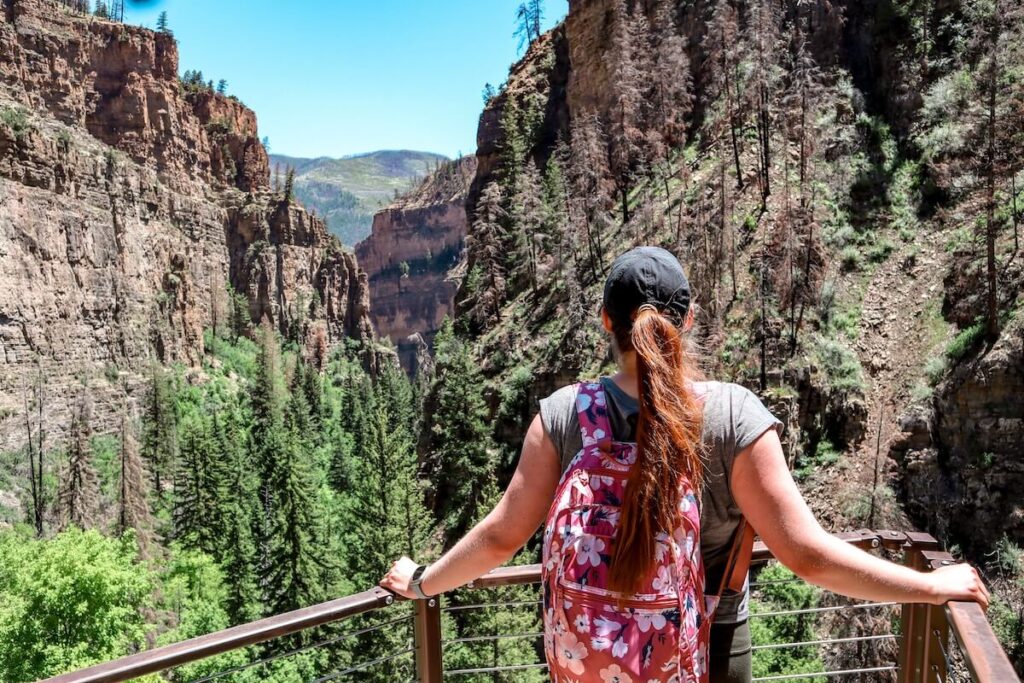
Backpack
The first hiking essential is a good sturdy backpack. I never go hiking anywhere without my camelback. This way, I have water and a place for other necessities.
Plus, it is so darn comfy I barely know that it’s there.
No matter what backpack you have, I always recommend one with cushy shoulder straps, a waist strap to take pressure off of your back, and a chest strap to keep it secure.
Water and Snacks
This might be obvious, but you would be surprised at how many people casually forget water on hikes like Hanging Lake.
Even if you think a hike is easy or it is shorter than your normal hike, Hanging Lake is hot and you have a tall vertical incline in not a lot of distance.
Water is the most important thing (along with good shoes) you can bring to Hanging Lake.
Keep in mind too that water is heavy, which brings me back to my point to also invest in a camelback or a good supportive backpack to protect your back and shoulders.
Here is a tangent for the former medical worker and EMT – with high heat and physically demanding hikes, please bring something small to eat along with drinking tons of water! This is less for your comfort and more so you aren’t passing out from low blood sugar and/or dehydration. Okay, EMT tangent done 🙂
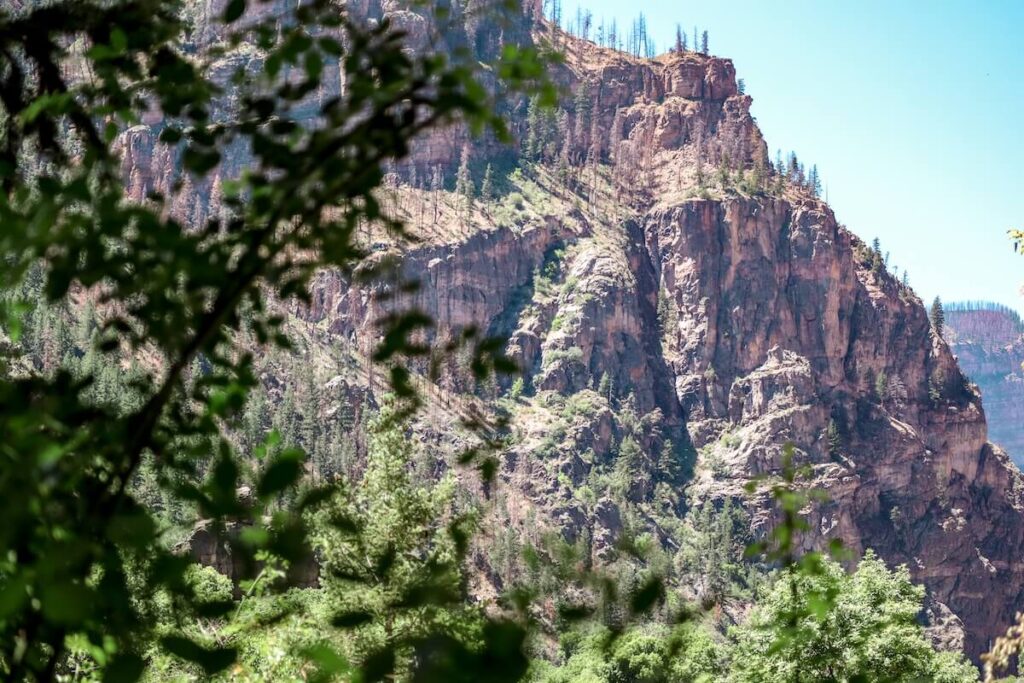
Good Shoes
Please, please, PLEASE bring good shoes. Don’t be fooled by the short mileage up–the entire trail is rock steps and there is only a short part at the beginning that is paved.
Plus, near the end of the hike is a pretty sketchy rock staircase that would be very unsettling in inappropriate footwear.
When I make the hike, I wore my good hiking boots and they were perfect! However, this isn’t the most intense hike and could probably be done in a sturdy pair of tennis shoes. When looking at shoes, I would look at the support for your foot and good traction for the rocky path.
Hiking Poles
If you are older, have bad knees, or just want some added support, you might want to consider bringing some hiking poles.
These can be especially useful for getting yourself up onto the higher rock stairs along the hike and can give you some peace of mind when descending.
Camera
If taking photos isn’t your thing, then this isn’t necessarily essential. As you will come to realize, Hanging Lake is gorgeous. And even the most anti-tech folks had to snap a picture!
If you are even remotely interested in photography, I would highly encourage you to bring something other than your phone.
This is a nature photographer’s dream! Plus, the hike isn’t too demanding so it is possible to hike with your camera gear and get those epic waterfall/forest shots!
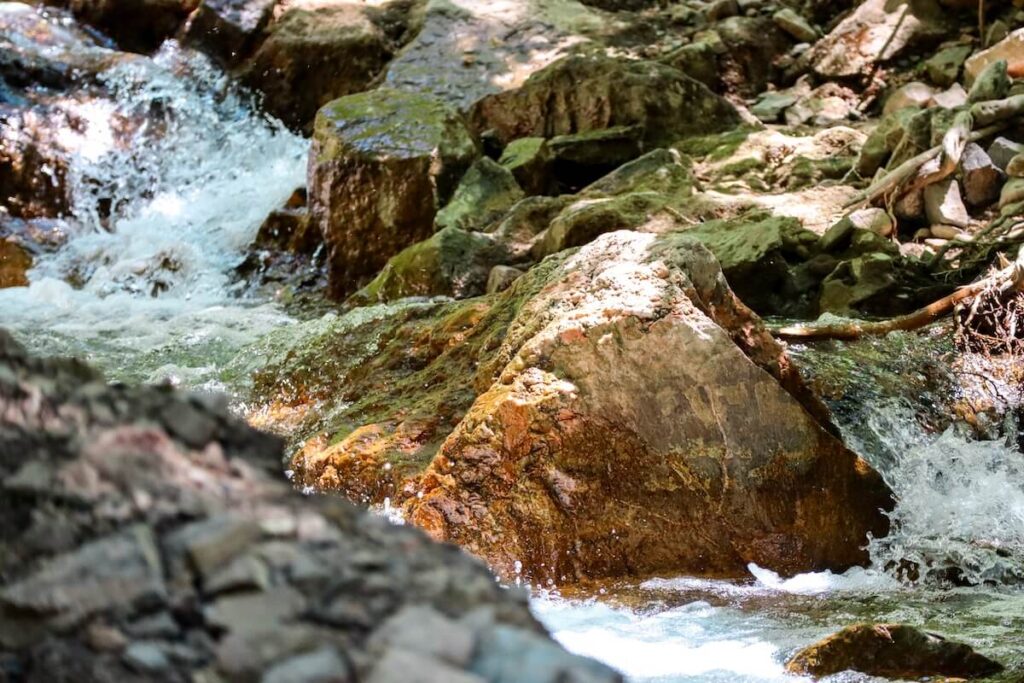
Sunscreen
I was pleasantly surprised at the amount of shade on the trail of this hike. There is plenty of tree coverage.
That does not mean that the sun won’t get you in certain areas if you aren’t careful. Just to be safe, I would bring plenty of sunscreen and reapply when you can.
Plus, it will give you a good excuse to take a small break and listen to the many waterfalls around you!
Small First Aid Kit
Although you most likely won’t need it, it is always good to be prepared with a small first aid kit or something similar.
As previously stated, most of the trail consists of loose rocks and rocky inclines. There is always a risk that you might fall and need some minor first aid.
I did not fall on this trip, but I did fall on a 14er hike, needed a bandage, and didn’t have one. I don’t want to get into the gory details, but it wasn’t exactly a peaceful hike and I ruined my leggings.
Whistle or Another Location Device
I am going to be honest, this is a highly trafficked hike with lots of people. You most likely won’t get lost unless you aren’t using common sense.
However, with any hiking activity in the mountains, it is always good to prepare if you lose your way or fall and need assistance.
Plus, there is little to no cell service once you get into the hike.
I wear an Apple watch that can send my location via satellite. You could also just pop a whistle or another location device into your backpack just in case.
It is always good to have it and not need it than need it and not have it!
Best Time to Visit Hanging Lake
Keep in mind that Hanging Lake is on a permit/reservation system. It is prone to closures due to fires and weather. The peak summer season is from May 1-September 30th.
See the FAQ section for more information about hiking Hanging Lake in the winter!
Best Time to Hike Hanging Lake
As far as timing, I would recommend the morning as early as possible. By doing this, you skip the dreadful mid-day heat.
I went at 12pm in the middle of July and I was sweating, even in the shade!
Keep in mind that Colorado is prone to afternoon thunderstorms. There is a lot of cover for lightning since it is below the treeline, but that is still very dangerous.
By going in the morning, you are more likely to avoid the heat and storms. Of course, I would always check the weather just to make sure you are prepared.
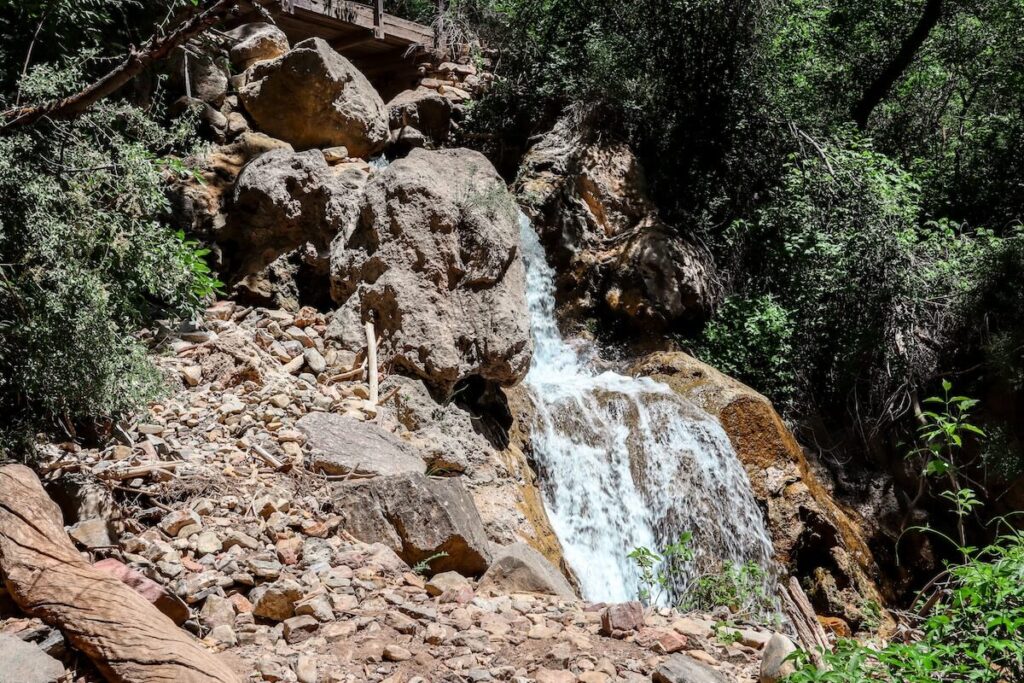
Hanging Lake Reservations and Permits
Hanging Lake requires reservations to be made online ahead of time.
The reservation process is relatively straightforward and easy to understand.
When we arrived, I simply showed the gate my reservations and we were let in.
They state that there is a 15-minute window on each side of your reservation in which you can enter, so make sure to plan your time accordingly to not be too early or late.
It is also good to keep in mind that the reservations are for 3 hours. I had some issues with this because I personally thought it was too short and didn’t allow enough time at the lake and waterfalls themselves, which was my only complaint with this hike.
We got back around the 4-hour mark and everything was fine, but I am sure there is some kind of penalty if you are there for a good chunk of time after your 3-hour reservation.

Where to Stay Near Hanging Lake
If you are not familiar with the area around Hanging Lake, there is an amazing town about 15 minutes (7-10 miles) away: Glenwood Springs.
This place is a bucket list destination in itself and a perfect location for relaxing post-hike activities.
Glenwood Springs is a historical mountain town that is home to numerous hot springs and spas. If you are looking for a place to wind down after your jaw-dropping hike, Glenwood would be the place to do it!
My favorite place to stay in Glenwood Springs is Hotel Colorado. It is very central to the main street of Glenwood Springs. Plus, it is luxurious and has a deep history–especially with Teddy Roosevelt.
How to Prepare to Hike Hanging Lake
As far as physical difficulty goes, Hanging Lake is relatively tame in comparison to some Colorado hikes.
To all of the wild nature lovers hiking the iconic Colorado 14ers, this is going to feel like a nice walk. For out-of-town folk or those who are not used to strenuous hikes, it may be a bit of a challenge. But it’s worth it—I promise!
It is about 1.2 miles up and then 1.2 miles back down. You do gain about 1,000ft in elevation just in those 1.2 miles.
Therefore, I would say that it is moderate difficulty combined with altitude. It may be an increased challenge for more older hikers or children.
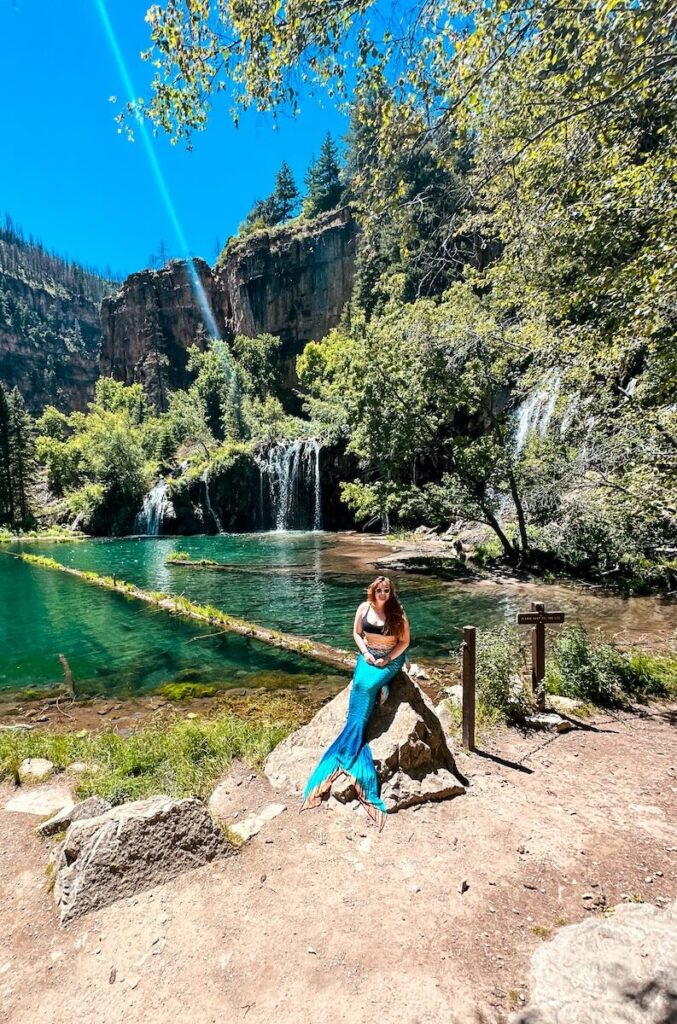
How You Can Train
If you are looking to train, I would do some hikes in your area first or hit a stair stepper at the gym. I know it sounds funny…but if you are at a lower elevation and are traveling to Colorado, I would actually suggest doing some form of cardio and singing! If this isn’t your jam, I would stick to cardiovascular/respiratory exercises mixed with deep breathing work.
This is how I trained for my unbelieveable high-elevation hikes (17,000+ feet) in Peru and it worked very well to train my lungs.
At the very least, I would work on getting into a rhythm of breathing while ascending stairs and making sure that your knees are strong for the rocky descent.
If you are coming from out of town at a lower elevation, I would HIGHLY recommend acclimating to the higher elevation for a few days first. You can be in the best shape of your life and the altitude can still cause problems. It just depends on the person!
If you ever start to feel woosy (like you are drunk!) during the ascent, stop, descend as much as you can and call for help.
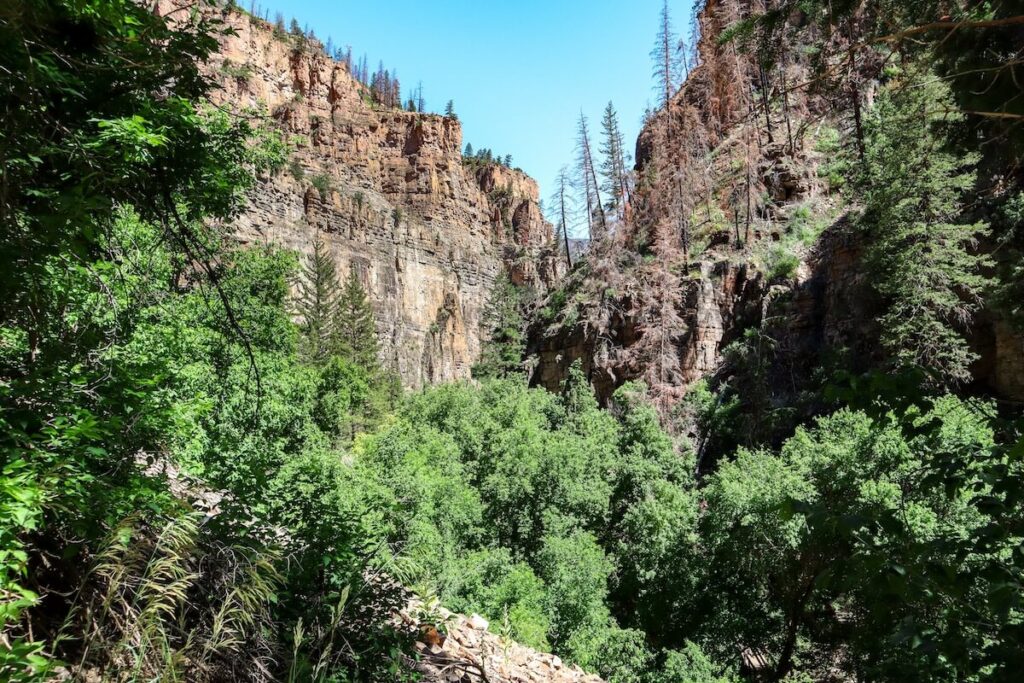
What to Expect When Hiking Hanging Lake
Parking
After making your way to the Hanging Lake Trailhead, you will make your way to the reservation gate. As mentioned before, a permit or reservation is required in advance and they do NOT sell permits on-site.
Getting through the gate was very easy and we were directed to the parking attendant that helped us park.
I did see some normal spots, but she asked us to parallel park.
After gathering all of our hiking gear from the car, we made a restroom stop before beginning our hanging lake adventure. There is no restroom at the lake, so make sure to go if you need to before you start on your hike.
The Hanging Lake Itself
There is a paved section at the beginning of the hike that provides great views of the canyon.
Once you hit a bridge, make sure to stay to your left!
When we were there, there was an attendant that made sure we didn’t miss it and go onto the wrong trail.
After that, it was all adventurous rocky ascents, gorgeous tree-covered trails, and magnificent waterfalls all the way up. Don’t forget all of the bridges that allow you to cross the rivers and waterfalls.
The ascent has you starting at Glenwood Canyon and then hiking through Deadhorse Creek Canyon all the way up to Hanging Lake.
Keep an eye out for some wildflowers, various wildlife (keep an eye out for deer, birds, or even black bears), and an old cabin structure.
Right before you get to the top, there is a section that consists of large rocks that form stairs at a steep incline. It is on the side of the cliff and might make a few visitors a little queasy. Take your time and scramble if you need—no one is judging you and will probably do the same thing.
Sprouting Rock
After you’ve enjoyed the view, you can make your way to Hanging Lake and enjoy a much-deserved view.
Important Tip: If it is open, I would HIGHLY recommend going up to Sprouting Rock.
The trailhead is right before you reach Hanging Lake and is only about a 5-minute easy hike (200 yards). Once at the top, you will be treated to two massive waterfalls that you can walk behind! My jaw literally dropped to the ground!
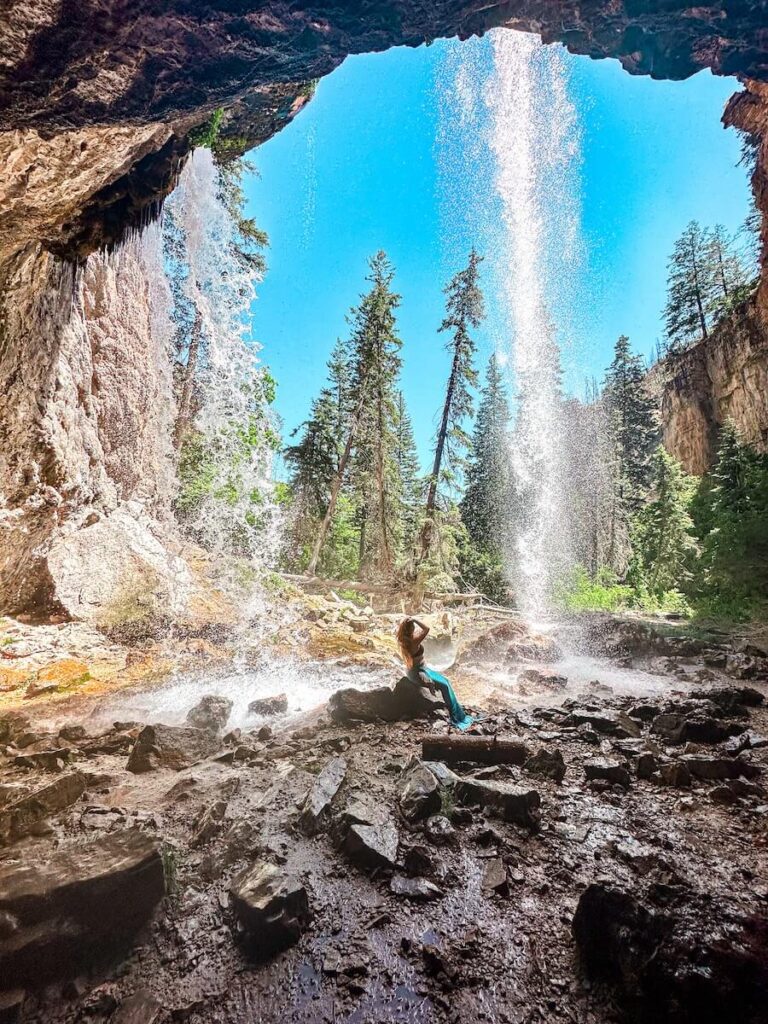
Adventure Photography Tips for Hiking Hanging Lake
Hanging Lake is a goldmine for outdoor photography. There’s crystal-clear water, floating logs, dramatic cliffs, and delicate waterfalls.
Even non-photographers geek out here.
Here’s how to make the most of it:
Best Time of Day for Photos
Early morning
- Soft, golden light hits the lake beautifully
- Fewer people = cleaner shots
- Water reflections are calmer
Late afternoon
- Warm light on the cliffs
- Waterfalls glow
- Great for silhouette-style shots on the boardwalk
Midday works too (colors get extra vibrant) just lean into polarizing filters.
My Go-To Travel Cameras: Canon EOS M50 mark II | Canon EOS 5D mark IV | What’s in My Camera Bag?
Camera Settings for Water, Movement & Color
For silky waterfall shots
- Shutter: 1/6–1/13s
- ISO: 100
- Aperture: f/8–f/11
- Bring a mini tripod or steady your camera on the railing
For crisp travel portraits
- Shutter: 1/250–1/400
- Aperture: f/2.8–f/4
- Use face tracking if you’re shooting each other
Editing for vivid turquoise water
- Increase vibrance, not saturation
- Lower highlights
- Boost clarity/texture on the logs and cliffs only
- Remove haze to reveal water detail
If you want more information on editing, I created a free guide as well as an in-depth eBook.
If You’re Hiking Solo
- Bring a compact tripod
- Use Bluetooth remote or 10-second timer
- Position yourself on the boardwalk (not off-trail because it’s protected!)
- Shoot at an angle so you get both the lake and waterfalls behind you
Pro Photography Tips
- Bring a lens cloth because mist from the waterfalls is real, especially the upper waterfalls.
- Don’t switch lenses mid-hike unless necessary (dust everywhere)
- Wide-angle lenses (16–35mm) capture the lake best
- Polarizing filter = richer water + less glare
- Take time to shoot reflection photos when the water goes still
Read More – Best Travel Lenses For Travel Photography
SHOT IDEAS FOR HANGING LAK
The Classic “Hero Shot”
Full lake + waterfall backdrop from the boardwalk.
Reflection Magic
Wait for calm water and capture mirrored cliffs.
Close-Up Texture Shots
- Floating logs
- Bubbling water
- Mossy cliffs
- Travertine rock patterns
Waterfall Movement
Slow shutter for dreamy water curtains.
Hiker Portrait
Standing on the boardwalk looking over the lake (frame from behind).
Trail Storytelling
- Steep stone steps
- Wooden bridges
- Creek rushing beside you
Color Pop Details
Bright clothing against the deep greens + blues of the lake.
Tips for Staying Safe When Hiking Colorado
Follow all Trailhead Signs
As with most hikes, always stay on the designated trail. Going off track or cutting the switchback is a good way to get lost, get hurt, or disturb sensitive wildlife and plants. Plus, it’s just good hiking etiquette.
Taking Breaks
It might be tempting to run up the trail—and that’s amazing if you can! But don’t forget to listen to your body and take breaks when you need them. Breaks can be a good way to rehydrate, take in your surrounding, and decrease overheating.
I have asthma and at one point the heat combined with the incline caused my breathing to become very labored. This was fixed with frequent short breaks and water. I didn’t even need my inhaler.
Luckily, if you do take breaks, it will be in an amazing view!
Wearing Good Footwear
As mentioned before, good footwear is essential to hiking anywhere in Colorado.
Part of the fun is not being on a perfect paved path…but it also increased the risk of falling and injury. It also means you need more support for your foot.
I’m not saying that you need to go out and buy expensive hiking shoes, but make sure to have a very sturdy and supportive tennis shoe that you are comfortable wearing.
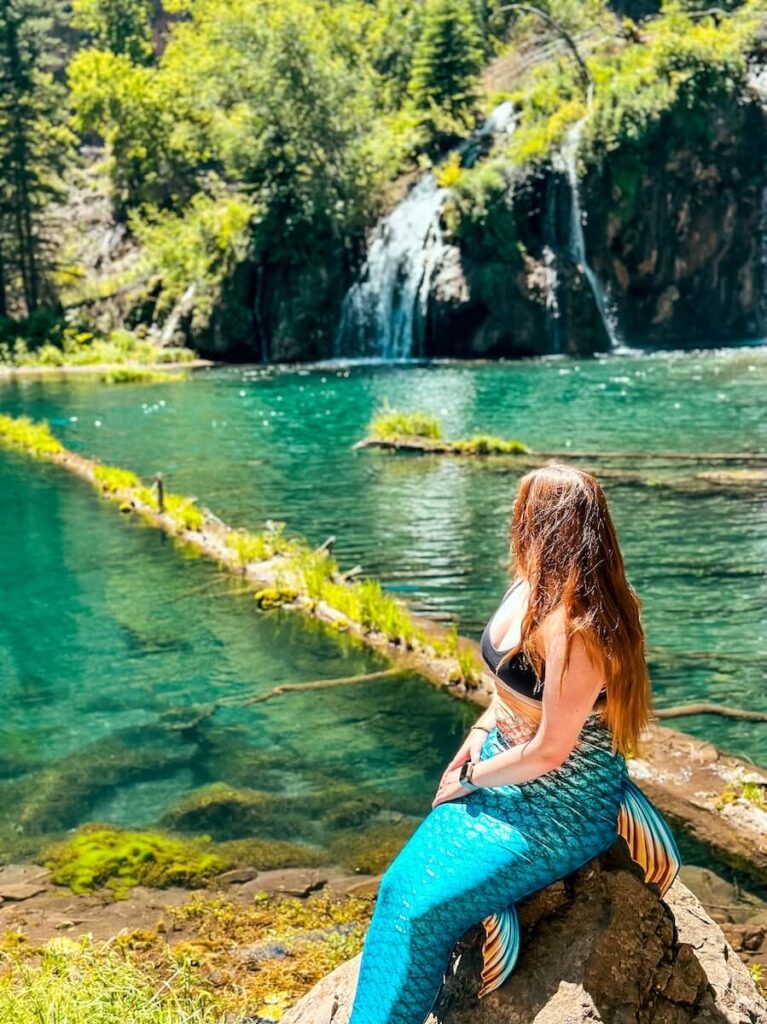
What To Do After Your Hanging Lake Adventure
As with any bucket list experience, I always recommend taking a few moments to reflect on your experiences. Whether this is practicing gratitude or thinking about what you learned, I found it is a good way to conclude checking off something from your bucket list!
And now that your legs are sore and you have sweat in places you don’t care to admit, go relax in some hot springs or do a spa treatment in Glenwood Springs!
Sounds like a perfect Colorado day to me! Here are some options for you to check out in Glenwood Springs after a rewarding day hiking up to Hanging Lake.
Vapor Caves
If you do anything “bucket-list worthy” in Glenwood Springs, I would check out the Vapor Caves at Yampah Spa. These caves are natural underground hot mineral water steam baths! This is one of the only known natural vapor caves found in North America!
The water in the caves comes through at 125 degrees and the caves sit at around 110-115 degrees! With all of the natural minerals and benefits, it has a detoxifying effect and is perfect after a day of hiking Hanging Lake.
Iron Mountain Hot Springs
If you are looking for a full on hot springs experience in a more luxurious setting, I would recommend checking out the Iron Mountain Hot Springs.
This spa features several hot springs with various temperatures and minerals, all while looking over the mountains and river.
If you are going, I would recommend going at a later time, maybe around 6:30 or 7 pm so that the temperature goes down. Then, you can also experience it during the later day, sunset, and nighttime.
Tickets run for 3 hours and you can add on an adults-only section with more pool choices.
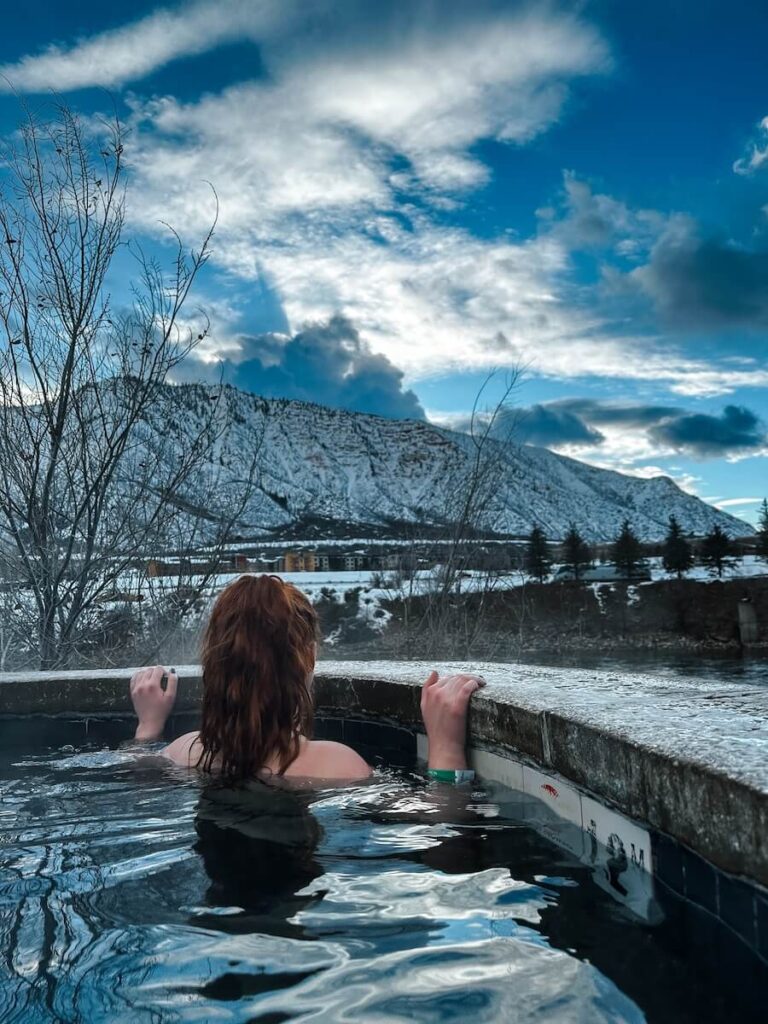
South Canyon Hot Springs
Bonus tip: if you don’t want to pay to get into the thermal spas, there are a few free hot springs knocking about! We went to the South Canyon Hot Springs.
Disclaimer: It is clothing optional, in the middle of nowhere, and its participants are mostly locals, but that might be exactly what you need after a long day of hiking Hanging Lake!
Hanging Lake Hike FAQ
How long is Hanging Lake hike?
I found that this is a simple question that depends on who you ask.
According to the reservation gate, it is 1.2 miles up and then another 1.2 miles down with an elevation gain of 1000 feet.
If you ask All Trails, they will tell you that the trail is 3.1 total, meaning it is 1.55 miles each way out and back.
According to my snazzy Apple watch, I walked 1.3 miles each way and gained 945 feet. Granted, I did walk up to the Sprouting Walk and around, so that could account for the added distance.
While you should take all distances with a grain of salt, I would expect to walk at least 1.3 miles just to be safe.
Fun fact: during this hike, my Apple watch said that I climbed an equivalent of 74 flights of stairs! Worth it? ABSOLUTELY!
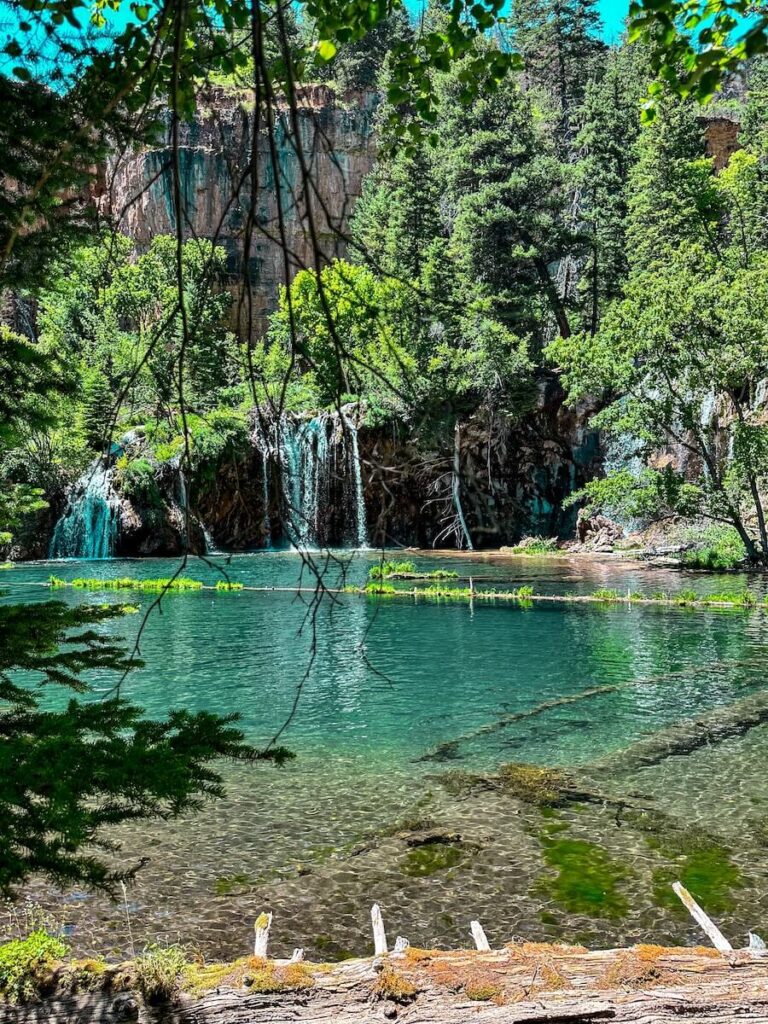
Is Hanging Lake hike difficult?
It depends on the person. To be honest, I would categorize it as “easy” for Colorado standards based on length, elevation gain, and amount of shade.
I by no means ran up to the top and did struggle at some parts, but overall it was a nice hike!
Of course, if you aren’t used to the elevation or Colorado hiking, there is a chance it might be more challenging. That’s okay! Drink plenty of water, take small breaks, and go one step at a time. Hiking is a personal journey and it is a marathon…not a sprint.
There will be people sprinting up like they do this every morning…if that is you, that’s okay too! And just know that I am very envious of you!
Do you need a permit to hike Hanging Lake?
Yes! You do need a reservation to hike Hanging Lake.
If you are worried, then don’t be! It is pretty easy to do. I would, however, recommend doing it as early as you can to avoid disappointment.
Although I didn’t need to print my reservation, I did have it on my phone and that was acceptable.
Where is the Hanging Lake hike in Colorado?
Hanging Lake is a popular hike near Glenwood Springs, Colorado. It can be found directly on exit #125 from Eastbound I-70 in Glenwood Canyon.
How far is Hanging Lake from Denver?
The Hanging Lake trailhead is about 2.5-hour drive from Denver, depending on where you are coming from.
It is 3 hours and 8 minutes away from Denver International Airport (DIA).
I think it would qualify as a “Day Hike from Denver”. I would caution you that it is going to be a long day if you choose this option!
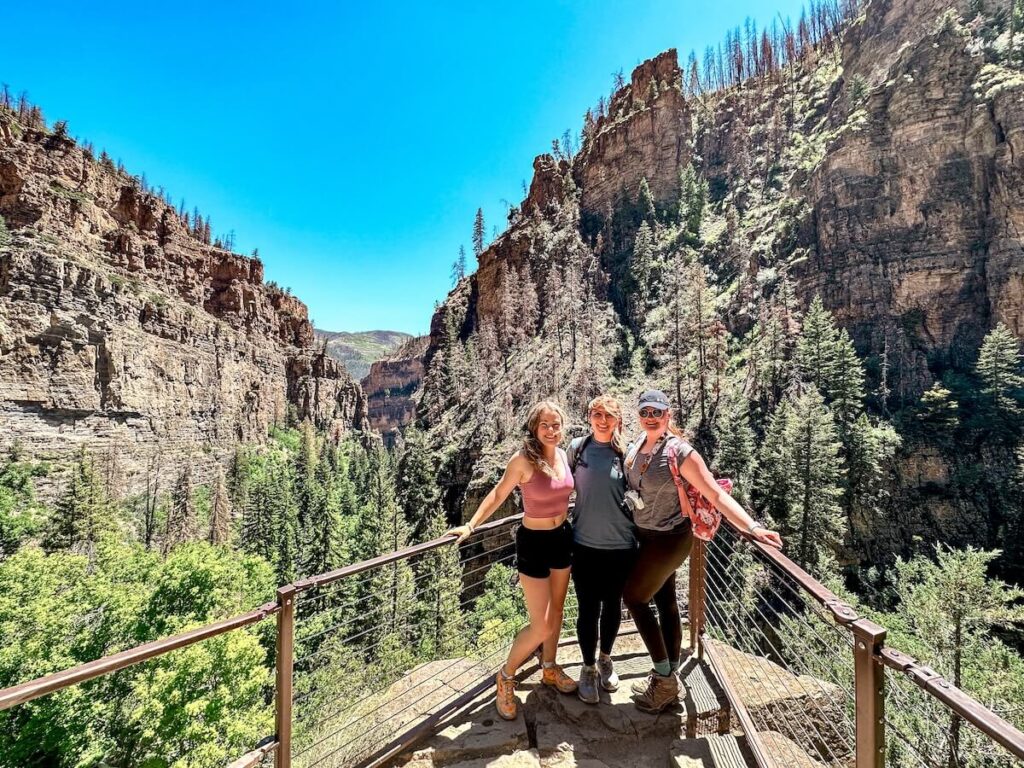
Are you allowed to swim in Hanging Lake?
Unfortunately, no.
The lake’s edge is built up by dissolved carbonate that is deposited on the shore as it flows from the waterfalls. All of the body lotions, oils, and skin cells can stop this deposition.
This was super disappointing to this mermaid, but I understand that you cannot swim in Hanging Lake in order to preserve the natural beauty of this site.
Can you drive to Hanging Lake?
You can drive to the Hanging Lake Trail Head. After that, it’s time to bring your best hiking shoes!
You can also bike or hike the Glenwood Canyon Recreation Path to the trailhead and then start the actual hike.
Both options cost the same and allow the same 3-hour time slot.
Are there restrooms available at Hanging Lake?
There was a restroom at the beginning of the trailhead at Hanging Lake. There are NO restrooms at the lake itself, so make sure to use the one back down at the start of the hike.
Why is it called Hanging Lake?
This magnificent Colorado hike got its name because it is located on a high ledge in a narrow canyon.
It is formed by a geological fault that causes the lake bed to drop away from the valley floor above.
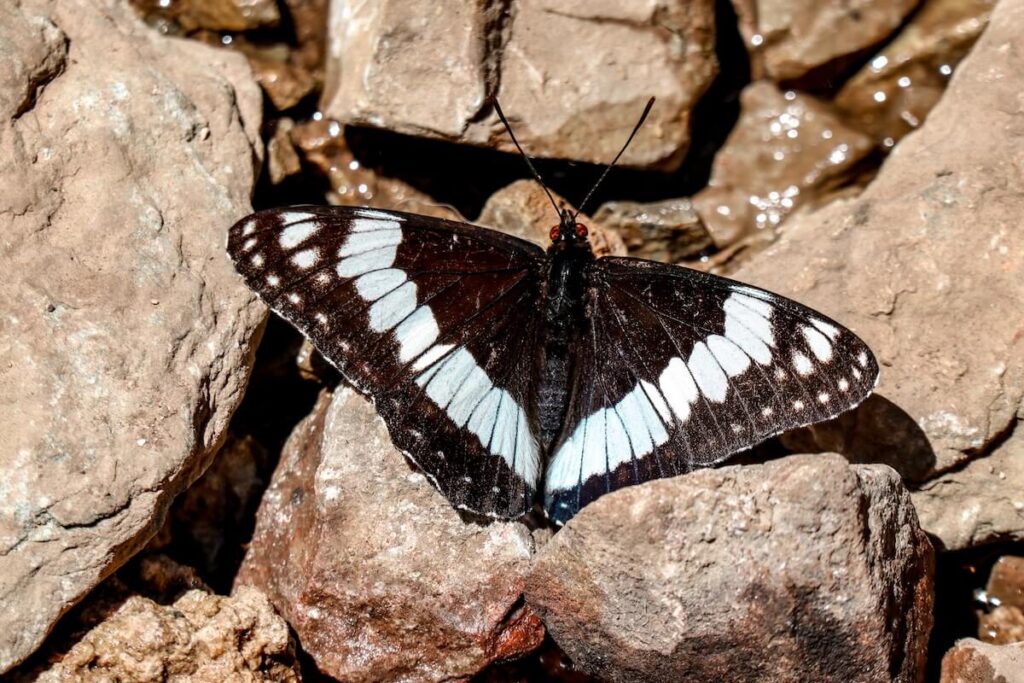
Can you hike Hanging Lake in the winter?
Summer permits are available from May 1 to September 30.
According to sources, it is still up in the winter but I would be very advised of this, especially if you are not used to or trained to hike during the winter.
The trail may be icy all winter. You can expect a steep and slippery hike with compacted ice and snow.
It is recommended to have traction footwear and to follow all regulations.
This is especially important because wildlife and vegetation are more sensitive due to the extra moisture and temperature changes.
Also, on the official website, there is a section to book during the winter and it is $10 per person. However, my personal experience is it always says, “unavailable” and I have never been able to do it.
You might have to call and get special permission to gain a permit to hike Hanging Lake during the winter.
Where can you camp near Hanging Lake in Colorado?
Although you cannot camp directly at Hanging Lake, there are some places near. You may need to still drive/hike/bike from your campsite to the Hanging Lake trailhead.
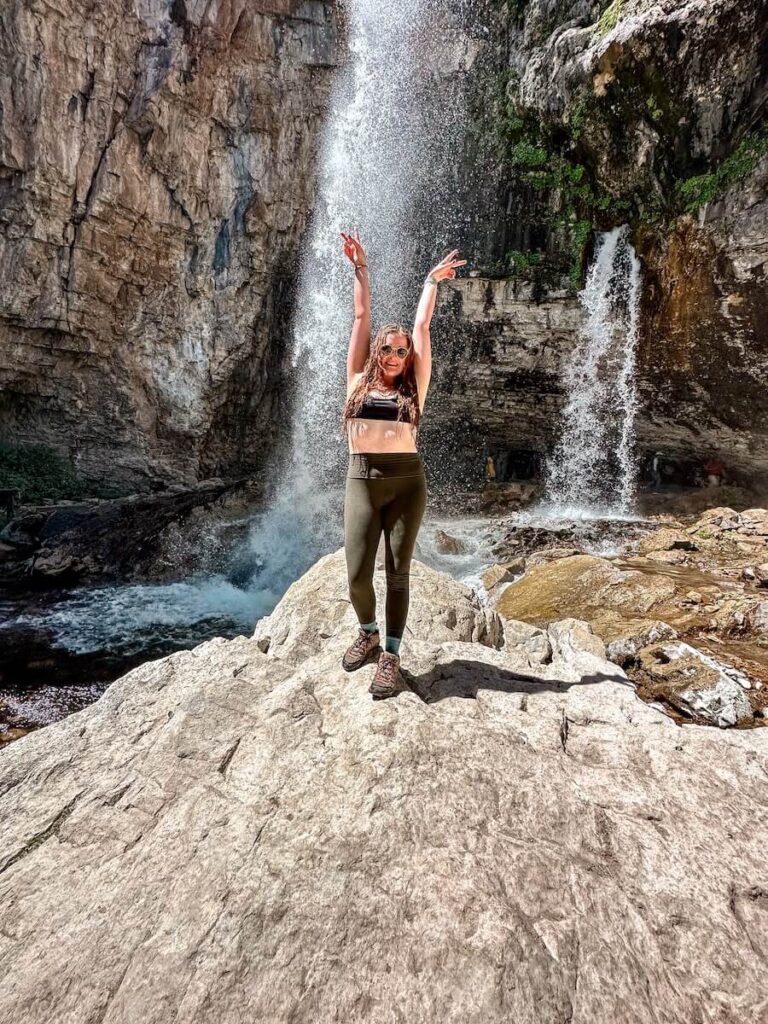
Is Hanging Lake worth it?
If you have made it this far through my massive Hanging Lake Guide, you will know my answer to this: absolutely!
Personally, I am an avid hiker and LOVE waterfalls. Therefore, Hanging Lake was heaven! It was everything: the water, the views, the trail!
Although the crowds can be mildly frustrating, this hike is still one of my favorite hikes in Colorado and is just the right amount of challenge for visitors or hiking enthusiasts!
If you are in the area and love to get outside, then this 100% needs to be added to your outdoor travel bucket list!
Final Thoughts on Hiking Hanging Lake from a Colorado Local
Hanging Lake is one of those rare trails that gives back far more than it asks.
Yes, the climb is steep, your legs will burn, and you’ll question your life choices somewhere around switchback #7. but then the forest opens, the waterfalls appear, and suddenly all you can think is: How is this even real?
Hanging Lake delivers its own brand of Colorado wonder. From the emerald waters to the moss-covered cliffs, every corner feels like a postcard.
So pack your day bag, grab your camera, breathe in that crisp mountain air, and start the climb. You’re not just hiking — you’re earning one of the most unforgettable and iconic views in the Rockies.
Go make the memory. Go take the photo. And enjoy crossing this adventure off your bucket list. 🌲💙📸
More Bucket list Hikes
So You Wanna Hike the 14er Mt. Bierstadt? Read This First!
Best Hikes in Buena Vista (From a Local + Photography Tips)
Best Glenwood Springs Hike with Waterfalls – Hanging Lake vs Rifle Falls Showdown
Half Dome Vs Angels Landing: Showdown of America’s Scariest Hikes
Adventure Bucket List Resources
I am here to help your travel adventures go as smoothly as possible! That way you can check off that bucket list with minimal complications and spending!
SHOP – Shop the best adventure gear and essentials on my Amazon Storefront – handpicked by a full-time adventuring mermaid!
AIRFARE – There are a few I use, but Aviasales is normally my go-to for flights without any extra fees or markups.
ACCOMMODATION – My two favorites are Booking.Com for hotels and VRBO for rentals.
GUIDED TOURS – If you are looking for quick and easy tours, check out GetYourGuide and Viator.
MULTI-DAY TOURS – For more in-depth tours that span several days, TourHub has many great options with reputable travel companies. Use my code (ALEXANDRA1GURU) for up to 5% off your next bucket list adventure.
TRANSPORTATION – You can either rent a car yourself with Discover Cars or do a guided bus tours like Big Bus Tours.
SIM CARDS – Avoid expensive roaming charges with an eSim card with Airalo. Personally, I prefer wifi boxes, and recommend WiFi Candy (get 10% of with the code THEBUCKETLISTMERMAID).
TRAVELER’S INSURANCE – Check out VisitorsCoverage for affordable insurance plans. If you are a nomad or remote worker, I would check out SafetyWing.
SEE MORE – Adventure Resources | Photography Resources
Love it? Pin it!
